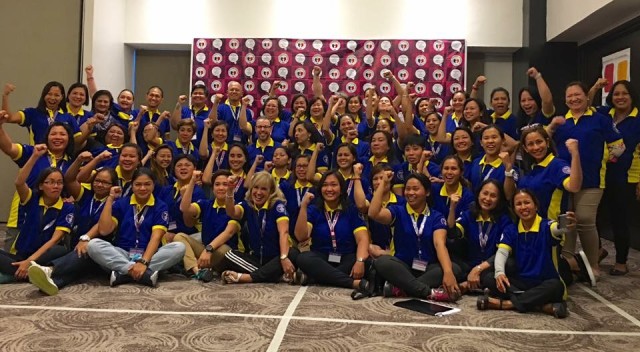
SPORTS SORORITY. Some of the country’s top female sports figures gathered in Davao City recently in a bid to engage more Filipinas in leadership roles.
THERE’S a new sisterhood in sports.
When some of the country’s top female athletes, coaches and officials gathered recently, a unique bond formed.
It all started with a three-day leadership seminar in Davao City with dynamic Swiss mentors Gabriela Mueller Mendoza and Thomas Gelmi, in a drive to push for the advancement of Filipinas in the male-dominated field of sports.
“We want to see more and more women rising up in leadership roles,” said Akiko Thomson-Guevara, the commissioner-in-charge of the gender and development program of the Philippine Sports Commission (PSC).
“We find from statistics that our female athletes do perform very well, based on their performances in the Southeast Asian Games. Around 40 percent of the medals are won by the women.”
“But what we find when we look at the number of coaches, referees, secretary-generals or presidents, we barely make 20 percent,” Thomson-Guevara continued. “We hope to address this issue and help build the confidence of our women by giving them tools and skills to step up and step out of their comfort zones, and actually desire more responsibilities.”
The 54 participants of the “Impulse Seminar: Empowerment of Women in Sports in the Philippines” came from various sports and regions.
Among them were Rubilen Amit, the country’s only two-time world champion in women’s billiards; Mitchel Martinez, the former Philippine boxing team standout now working as the only female coach of the national team; and differently-abled weightlifter Adeline Dumapong-Ancheta, the first Filipina Paralympic medalist.
But more than just a gathering of Filipina sports figures, the event led to new friendships as many discovered how they flourish in sports but face similar challenges, from leadership issues to organizational limitations to motherhood.
“We found each other,” said Mueller Mendoza.
The group may be shaping into a sports sorority, with many still linking up and vowing to support each other’s causes.
“Sports is a great avenue to enhance and encourage women to bring out all their talents and abilities that we can apply in different areas of our lives,” said Mikee Cojuangco-Jaworski, a member of the International Olympic Committee (IOC).
“It’s very intentional now with the selection of athletes where there’s an effort to send, as much as possible, equal number of male and female athletes.”
“Definitely we will be seeing more and more women engaging in sports,” added PSC chair Richie Garcia.
“The drive of the IOC and POC (Philippine Olympic Committee) is to put more women in sports, not only as athletes but also as administrators. The NSAs (national sports associations) are now being requested to put more women in their board because of that drive of having 50 percent of the officers and athletes to be women.”
But the group aims to make it more than just lip service and intends to work on the goal of putting more women at the forefront of Philippine sports.
“We will expect concrete outcomes,” said Mueller Mendoza. “Not just the next level of leaderships they’re personally going for, but also what kind of future projects they will launch to support women and men in Philippine sports.”
“There’s added value in gender diversity in any organization,” said Gelmi. “We want these women to become role models who will invite, encourage and inspire other women to step on the same path.”

